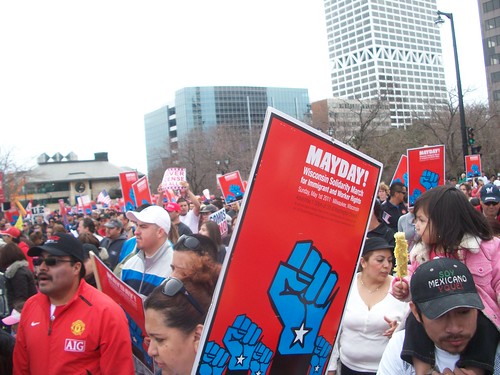
May Day 2011 in Milwaukee enjoyed the participation of over 100,000 workers, youth and community people who marched through the downtown area to the lake front. Wisconsin has been a focal point for the economic crisis. (Photo: Abayomi Azikiwe), a photo by Pan-African News Wire File Photos on Flickr.
Wisconsin and Egypt: A tale of two uprisings
Reflections from a Madison labor activist in Cairo
Alex Hanna
Monday 07/18/2011 3:00 pm,
The sun rises against a smoggy Cairo sky as I write this on Friday, the day of rest and prayer in the capital of Egypt. It also marks the first full week back in historic Tahrir Square for Egyptian protesters. They've gotten better at their craft of occupying the space, setting up fans, air conditioners, and lighting in personal tents.
The comparison between Cairo and Madison has been made on more than one occasion, by high-profile figures from state Senator Lena Taylor (D-Milwaukee) to Code Pink activist Medea Benjamin. It's overwrought and problematic on many levels, but what we can compare between the two is what has happened since each uprising, and what it says about our own political imagination.
In Egypt, protesters are demanding largely the same things that they were in January and February: an end to corruption in government, a total overhaul of the notorious police force, a restructuring of the judiciary, no military trials for civilians, a rewrite of the constitution, and an increase in social spending and the minimum wage. Simply put, they want a free, democratic and socially responsible country.
The central demand from earlier in the year, the overthrow of Mubarak, is no longer relevant, but most activists believe that Mubarak's regime is more than just Mubarak.
The Supreme Council of the Armed Forces (SCAF) has been more than willing to continue the tradition of authoritarianism practiced by Mubarak and his predecessors. I’ve spoken with several activists, and they see the revolution as far from complete, some saying they wished they had never left Tahrir after February 11.
But a wall has been broken, meaning freedom from fear and the willingness to engage in political experimentation. For example, blogger and activist Alaa Abd El-Fattah created what is called the #TweetNadwa, nadwa being the Arabic word for "seminar" or "study group." The forum takes a certain political topic and throws it open for discussion, to both a set of panelists and the audience.
Each audience speaker is only allowed 140 seconds to comment, a nod to Twitter's 140-character limit. Topics can be as broad as social justice or as specific as how to reform the police and the judiciary. These were the subjects of the last two #TweetNadwas, held in a grassy area of Tahrir Square and open to all the protesters there.
This is only one expression of the continuing political work of Egyptian activists. There is the much harder work of party-building and organizing citizens in preparation for the upcoming parliamentary and eventually presidential elections. The space is also opening up for the development of independent trade unions, freed from the shackles of the yellow union, which workers are forced to join by the state.
Back in Madison, the focus has been on the recall elections. As we're all well aware, If the Democrats can hold onto their three seats and flip three more, the Senate will revert to Democratic control. Gov. Scott Walker's hands would then be tied in pushing through more of the poisonous legislation we've seen over the past six months.
Wisconsin is, of course, not Egypt. We have legal redress, and we have a recall procedure. And while it's been a monumental recall effort, there is statute that governs it.
The only thing the SCAF can hear, however, is thousands of people calling for its replacement with a transitional government. It seems to be working, with Prime Minister Essam Sharaf firing nearly 700 members of the security apparatus in connection with the murder of the nearly 1,000 martyrs of the January 25 revolution.
Human rights groups and protesters are saying that this isn't enough and will continue to press until police have gone to trial and are convicted.
Just as Egyptian activists wish they had never left Tahrir, maybe we shouldn't have given up the Capitol so easily. As Jack "The Sconz" Craver has opined, campaigning on collective bargaining rights isn't that sexy anymore. And perhaps it's been a failure of our own political imagination.
We've been so engrossed in the recalls that the question of "how to keep the momentum going" has gotten looped into the means-to-an-end that are the recalls. We should think about what got us into this situation to begin with.
In our own way, we have to retake Tahrir. What about looking into our own organizations -- our schools, universities and workplaces -- and trying to build power within them? How about reforming our unions in such a way that they are oriented toward a culture of organizing and of collective power? The power of the union doesn't lie in the law. Although labor law is often the consequence of union actions, union power comes from workers acting collectively and in solidarity with one another.
So while political imagination is blooming in Cairo, it is somewhat disappointing in Wisconsin. And it's not for lack of a history of innovators. We are the state of Fighting Bob La Follette, of the Wisconsin Idea, and of the first public sector collective bargaining rights in the nation. Let's find our #TweetNadwa. More concretely, let's renew our parties, our institutions and our unions.
----------------------------------
Alex Hanna is a PhD student in sociology at the University of Wisconsin-Madison. He is co-president of the Teaching Assistants' Association, AFT #3220, and is currently in Egypt doing fieldwork on social media and social movements.
No comments:
Post a Comment